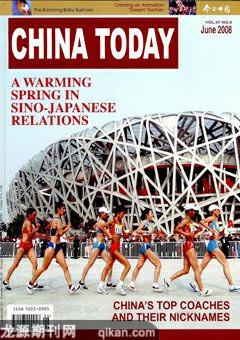Be Calm,Be Confident
WU JIANMIN
AS the 2008 Beijing Olympic Games approach, China has become the focus of world media attention. Certain groups hostile to the PRC have been using the occasion to demonize the country and pressure the government. They have made a concerted effort to stir up trouble and generate controversy at home and abroad, and a number of Western media have amplified the resulting cacophony, producing distorted reports about China and infuriating Chinese everywhere.
How should we view this situation? I think we should analyze it comprehensively. That the International Olympic Committee made its decision on July 13, 2001 to grant Beijing the 2008 Olympic Games is not a coincidence. Looking back, since the first modern Olympic Games were held in 1896, China is the second developing nation to host the grand world sporting event, after Mexico in 1968. Olympic sports belong to all of humanity, to developed and developing countries alike.
In terms of international relations, since the end of the 20th century a number of developing countries have quickened their pace of development, such as ASEAN countries, China and India in Asia; South Africa and Nigeria in Africa; and Brazil, Mexico and Chile in Latin America. Together, they add up to nearly half of the worlds population.
The current world population is 6.6 billion, and only 1 billion are in developed countries. The rest are scattered throughout the developing world. That more than half of the global population is rising simultaneously is unprecedented, representing the dominant trend in international relations in the 21st century. As a result, the hosting of the 2008 Olympics in Beijing has been warmly welcomed and supported by developing nations, an enthusiasm reflected in their warm reception of the Beijing Olympic torch relay. It symbolizes the inroads that Olympic sports are making into developing countries.
Certain people in developed countries who are trying to politicize and demonize the Beijing 2008 Olympic Games do not represent the voice of the majority. I believe the majority of the people support the 2008 Olympic Games, as the event belongs not only to China, but also to the world.
As a major world event, the Olympic Games have frequently stirred up incidents in almost every host city in the past as groups with agendas sought to draw the worlds attention to their causes and ideologies, and Beijing is certainly no exception.
How, then, to handle these incidents? China is a country of laws, and all people coming for the Games are subject to the rules established by the International Olympic Committee and Chinese legislation. We should not be afraid of troubles. No troublemaker has ever succeeded in sabotaging the Olympic Games, nor will anyone succeed in Beijing.
Hosting the Olympic Games has long been a cherished dream for the Chinese people. They consider it a great honor and a significant event in their lives. It gives them an opportunity to contribute to the world and to help advance the Olympic movement. Any disruption of the Games would harm not only China, but the world as a whole. We should treat the various incidents and negative commentary about the Games calmly, objectively and rationally.
As to the recent riots in Tibet, it is obvious that some have been trying to split Tibet from China. That is unacceptable to China and has deeply disturbed the Chinese people. However, our patriotic sentiments should be expressed rationally to avoid making any costly mistakes. There have been some radical speeches and actions by some Chinese to express their anger and to protest biased reporting about China by the Western media,such as boycotting Carrefour and French commodities. But such actions are counterproductive. Most employees in Carrefour China stores are Chinese, and the goods they sell are mostly made in China. So why boycott ones own business?
People all over the world are patriotic, and so are the Chinese. Patriotism is closelyaligned with the core interests of a nation. The core interest of present-day China is prosperity and unification, and unity is the precondition for prosperity.
The year 2008 is an important one for China, and we face many tests and challenges. We should have a clear understanding of the present situation, and follow the laws and regulations in handling our affairs in order to make the 2008 Olympics a prestigious and successful event.
WU JIANMIN is former president of the Foreign Affairs University of China.

